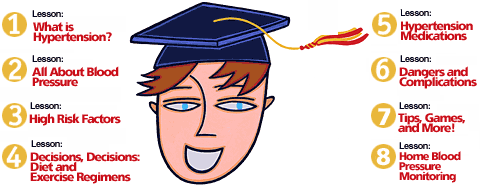



 |
|
|

|
|
Hypertension Lesson 6 - Dangers and Complications 
Back to Hypertension Channel Mental deterioration: Hypertension is associated with mental deterioration in older people, including Alzheimer's disease, dementia, reduced short-term memory and attention spans. The higher your blood pressure, the greater the risk of mental deterioration. Adequate control of blood pressure can help ward off memory loss and reduce the risk of dementia. Sexual dysfunction: About 17% of hypertensive men are affected by some form of sexual dysfunction. It is often caused by the medication used to control hypertension, but there are indications that the condition itself may impair sexual function. However, in most cases, impotence related to hypertension is treatable. Stroke: Hypertension is the major predisposing cause of stroke! Left uncontrolled, high blood pressure can really harm those arteries, causing them to become stiff, thick, and to narrow faster. Hence, less blood is able to make its way to the brain. If a blood clot or the effect of artherosclerosis blocks an artery such that it becomes impossible for the brain to get adequate oxygen from blood, a thrombotic stroke may occur. Similarly, if a fatty deposit comes loose from the arteries or a blood clot forms in a damaged heart chamber and is finally expelled, it can be carried by your pumping blood straight to the vessels that supply your brain, thereby blocking the blood supply. The result is called an embolic stroke. Finally, a hemorrhagic stroke can occur if the blood pressure is so high that it causes a break in a weakened blood vessel in the brain. This in turn causes internal bleeding in your brain that can both kill that portion of your brain and create pressure against the skull that can result in further brain damage. High blood pressure is the number one modifiable risk factor for strokes. Your risk decreases when your blood pressure decreases via anti-hypertensive medication. Page 1 2 3 4 5 Copyright © 2000-2025 savvyHEALTH.com. All rights reserved.
|
|
|
||||||||||||||||
|
About savvyHEALTH | Privacy | Feedback | Home
http://www.savvyHEALTH.com/
All contents copyright © 1999-2025 savvyHEALTH, Inc. All rights reserved.
This internet site provides information of a general nature and is
designed for educational purposes only. If you have any concerns about
your own health, you should always consult
with a physician or other healthcare professional. Please review the Terms of Use before using this site. Your use of the site indicates your agreement to be bound by the Terms of Use.
|
|